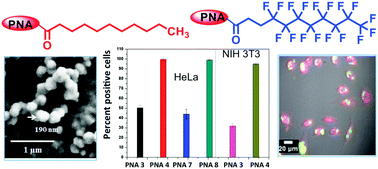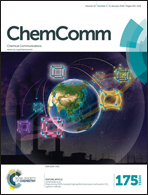Perfluoroalkylchain conjugation as a new tactic for enhancing cell permeability of peptide nucleic acids (PNAs) via reducing the nanoparticle size†
Abstract
Perfluoro undecanoyl chain conjugated peptide nucleic acids (PNAs) show 2.5 to 3 fold higher cellular uptake efficiency in NIH 3T3 and HeLa cells compared to simple undecanoyl PNAs. Fluorination of PNAs leads to the formation of lower size (∼100–250 nm) nanoparticles compared to larger size (∼500 nm) nanoparticles from non-fluorinated PNAs, thereby improving the efficiency of cell penetration.


 Please wait while we load your content...
Please wait while we load your content...